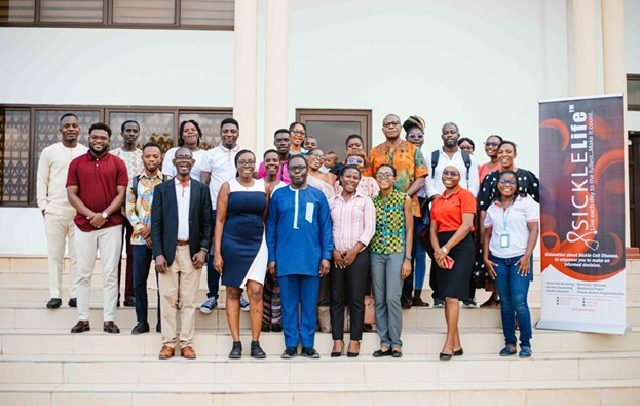The participants
Dr. Enam Sefakor Bankas, the Managing Director of Sickle Life, says a comprehensive and integrated policy for Sickle Cell Disease (SCD) is needed to improve the diagnosis, treatment and care of people with SCD in Ghana.
She observed that the absence of the policy, accompanied by inadequate funding, has impeded the implementation of effective interventions for SCD in the country.
“One of the major problems we highlighted today is the fact that screening facilities are not available everywhere. So people are not able to get tested for sickle cell and know their actual genotype. So once we have a national sickle cell disease policy, we can have access to medication and proper care for people with sickle cell disease,” she explained.
She made this suggestion at Sickle Life Research Conference held in Accra. This conference was for them to share their findings on the Importance of community-based screening for sickle cell disease, and the Impact of support groups on the health-seeking behaviour of patients and their caregivers.
She revealed that there are many non-governmental organisations (NGOs) that work to help people with SCD, but they are not enough to meet the needs and demands of the people with SCD.
“So our findings, which are consistent with the data out there, is making the case that community-based organisations, such as sickle life, needs to get more funding so that we can go into the various communities and provide the service that is very, very critical,” she stated.
She therefore called for more funding and support for NGOs that work with people with SCD, and for a national policy and funding for SCD in the country.
She also revealed that HB electrophoresis is not widely available in the country, and that people should have access to this test so that they can make informed decisions about their health and their family planning.
“Now, there are many centres in the country where even HB electrophoresis is not available under the standard test. When people go around and they are doing sickle cell tests, they are doing the basic test, but then we want people to know their actual genotype, so that they can make an informed decision about sickle cell disease,” she noted.
Their research evaluated the impact of their support group on the members’ knowledge, perceptions and health outcomes related to SCD.
They found out that being in a support group improved all these aspects and reduced the frequency and severity of sickle cell crises.
The Director for Centre for Tropical Clinical Pharmacology and Therapeutics at the University of Ghana Medical Centre (UGMC), Professor George Obeng-Adjei, discussed the situation of sickle cell disease research in Africa and the need to bridge some of the existing gaps in academics.
He also emphasised the importance of listening to the voices and experiences of people with SCD and their families, and how they participate in community support groups.
He therefore believes that, increased involvement of NGOs can facilitate more research on SCD, leading to a better understanding of the disease and informing evidence-based policies.
By Nafisa Abdul Razak

